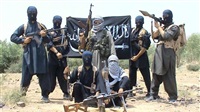Between simulation and difference: Study reveals effect of extension of Daesh on other terrorist organizations
Wednesday 22/May/2019 - 01:21 PM

Ahmed Sultan
The Middle East Institute of Studies said that organizing the actions of the Daesh organization has motivated the rest of the other organizations to try to create a different mental image in the world after the unprecedented wave of terror spread by the terrorists.
"The Afghan Taliban and their counterparts in Pakistan and al-Qaeda in the Indian subcontinent have developed some sort of internal labor regulations, following the emergence and rapid expansion of the Daesh organization that began in late 2013," the institute said in a new study.
According to the study, the leader of the Afghan Taliban in 2017 published a 130-page document entitled Guidance to the Mujahideen, and the movement printed 5000 copies and distributed them to its elements and supporters.
The Taliban document focused on general terms, such as piety and unity alongside power, and discipline to urge elements of the organization to follow the leadership of the movement and not to think of splitting or joining a branch of Daesh in Khorasan, after several splits hit the movement.

Terrorism is changing its skin
Zada tried to be distinguished from the organization of Daesh, through the document, and called for elements to treat the prisoners well and release them on certain occasions, unlike the organization of Daesh, that was famous for the criticism of prisoners in its media releases.
According to the study, al-Qaeda in the Indian subcontinent issued an internal regulation by 2017 through the Al-Sahab Media Foundation, explaining that the new branch of Al-Qaeda was established to ensure the organization in the subcontinent.
Although the new branch of al-Qaeda from the Indian subcontinent has been the scene of its operations, it confirms its support for the Taliban and stands by them.

Pakistan’s Taliban
The new al-Qaeda branch is trying to identify with other terrorist organizations, making them "brothers" in the target and working methods as described by the terrorist list.
In the same context, the Pakistani Taliban movement released its document on the rules of work in 2018.
The leader of the new movement, Mufti Nurullah Wali Mehsud, tried to gain momentum through the new document, after taking over the leadership unlike the former leader Mullah Fadlallah.
The Pakistani Taliban has adopted a new slogan similar to the motto of Daesh, but with a white background as the banner of the Taliban, which some considered to be close to Daesh, while maintaining relations with the Afghan Taliban.
The movement of the Taliban has suffered major splits in its ranks following the announcement of an organization calling for the alleged caliphate.
The new document has focused on mobilizing the Taliban for loyalty to the movement, adhering to its work guidelines, which are similar to al-Qaeda's, and trying to neutralize as many enemies as possible.
The terrorist movement imposed greater restrictions on the implementation of suicide attacks, restricting its implementation with the approval of the leadership of the organization and the Shura Council, and prohibited communication between the current and dissident elements of the movement.









